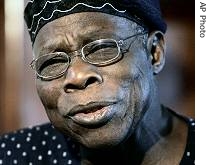-
(单词翻译:双击或拖选)
By Gilbert da Costa
Abuja
16 August 2006
 President of Nigeria Olusegun Obasanjo |
||
President Olusegun Obasanjo branded those behind the current wave of kidnappings in the delta as terrorists.
The Nigerian leader told security chiefs, oil companies executives and governors from the delta that the administration will no longer tolerate acts of violence now threatening the oil industry. He said the government will place sanctions on any government or oil industry body that pays ransoms2.
Previous crackdowns on militants3 in the delta led to an escalation4 in violence. Emma Amanze, a journalist with a long experience covering the delta, says the use of force by the government is not the most plausible5 solution.
"The kidnappings we are seeing now are isolated6 ones," said Amanze. "They are not like the organized ones. It is just some few people in one or two communities doing that on their own. It is not like the very first ones. In all, what should still be done is consultation7, dialogue. There is no way taking the fight to them is going to solve it. So far, the government has not been able to match them force for force. If they still want to continue, the militants are well armed."
Thousands of troops have been deployed8 in the region, but they have failed to counter the growing violence.
The sheer number of oil installations and pipelines10 makes protection of oil infrastructure11 and personnel difficult. Shell, which is the largest foreign oil company in Nigeria, has more than 1,000 oil wells, and these wells are linked to a 6,000-kilometer pipeline9 network.
About 16 foreign oil workers have been kidnapped in the past two weeks. Nine have been released unharmed.
Local press reports suggest some international oil companies in Nigeria have demanded an urgent improvement in the security situation
The kidnappings and attacks in the past seven months have forced a production shutdown of 500,000 barrels per day of oil in Nigeria. The country is Africa's leading oil producer, and derives12 about 95 percent of export earnings13 and 40 percent of its gross domestic product from oil sales.
 收听单词发音
收听单词发音
1
delta

|
|
| n.(流的)角洲 | |
参考例句: |
|
|
|
2
ransoms

|
|
| 付赎金救人,赎金( ransom的名词复数 ) | |
参考例句: |
|
|
|
3
militants

|
|
| 激进分子,好斗分子( militant的名词复数 ) | |
参考例句: |
|
|
|
4
escalation

|
|
| n.扩大,增加 | |
参考例句: |
|
|
|
5
plausible

|
|
| adj.似真实的,似乎有理的,似乎可信的 | |
参考例句: |
|
|
|
6
isolated

|
|
| adj.与世隔绝的 | |
参考例句: |
|
|
|
7
consultation

|
|
| n.咨询;商量;商议;会议 | |
参考例句: |
|
|
|
8
deployed

|
|
| (尤指军事行动)使展开( deploy的过去式和过去分词 ); 施展; 部署; 有效地利用 | |
参考例句: |
|
|
|
9
pipeline

|
|
| n.管道,管线 | |
参考例句: |
|
|
|
10
pipelines

|
|
| 管道( pipeline的名词复数 ); 输油管道; 在考虑(或规划、准备) 中; 在酿中 | |
参考例句: |
|
|
|
11
infrastructure

|
|
| n.下部构造,下部组织,基础结构,基础设施 | |
参考例句: |
|
|
|
12
derives

|
|
| v.得到( derive的第三人称单数 );(从…中)得到获得;源于;(从…中)提取 | |
参考例句: |
|
|
|
13
earnings

|
|
| n.工资收人;利润,利益,所得 | |
参考例句: |
|
|
|















